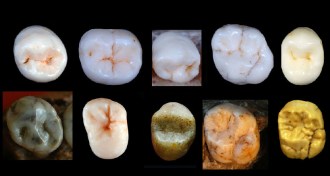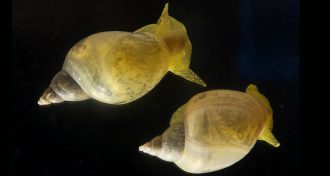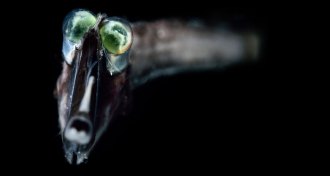Uncategorized
-
 Animals
AnimalsSome dog breeds may have trouble breathing because of a mutated gene
Norwich terriers don’t have flat snouts, but can suffer the same wheezing as bulldogs. It turns out that a gene mutation tied to swelling could be to blame.
-
 Life
LifeBloodthirsty bedbugs have feasted on prey for 100 million years
Research sheds light on the evolutionary history of the bloodsucking bedbugs. The first species evolved at least as early as the Cretaceous, scientists say.
-
 Anthropology
AnthropologyFossil teeth push the human-Neandertal split back to about 1 million years ago
A study of fossilized teeth shifts the age of the last common ancestor between Neandertals and humans.
By Bruce Bower -
 Planetary Science
Planetary ScienceChina’s lunar rover may have found minerals from the moon’s mantle
The Chang’e-4 mission spotted material on the lunar surface that appears to contain bits originating from the moon’s interior.
-
 Animals
AnimalsPeacock spiders’ superblack spots reflect just 0.5 percent of light
By manipulating light with tiny structures, patches on peacock spiders appear superblack, helping accentuate the arachnids’ bright colors.
-
 Artificial Intelligence
Artificial IntelligenceAI can learn real-world skills from playing StarCraft and Minecraft
By playing StarCraft and Minecraft, artificial intelligence is learning how to collaborate and adapt.
-
 Genetics
GeneticsTweaking one gene with CRISPR switched the way a snail shell spirals
The first gene-edited snails confirm which gene is responsible for the direction of the shell’s spiral.
-
 Planetary Science
Planetary ScienceApollo-era moonquakes reveal that the moon may be tectonically active
Moonquakes recorded decades ago suggest the moon is tectonically active. Knowing more about that activity could help scientists identify where to land future spacecraft.
-
 Artificial Intelligence
Artificial IntelligenceA new AI acquired humanlike ‘number sense’ on its own
A new artificial intelligence seems to share our intuitive ability to estimate numbers at a glance.
-
 Science & Society
Science & SocietyCelebrating scientists who ask big questions
Editor in Chief Nancy Shute discusses scientists who are asking important questions for society.
By Nancy Shute -
 Ecosystems
EcosystemsReaders were curious about green icebergs, aliens and more
Readers had questions and comments about icebergs and climate change, CBD and NASA’s search for E.T.
-
 Animals
AnimalsDeep-sea fishes’ eye chemistry might let them see colors in near darkness
An unexpected abundance of proteins for catching dim light evolved independently in three groups of weird deep-sea fishes.
By Susan Milius